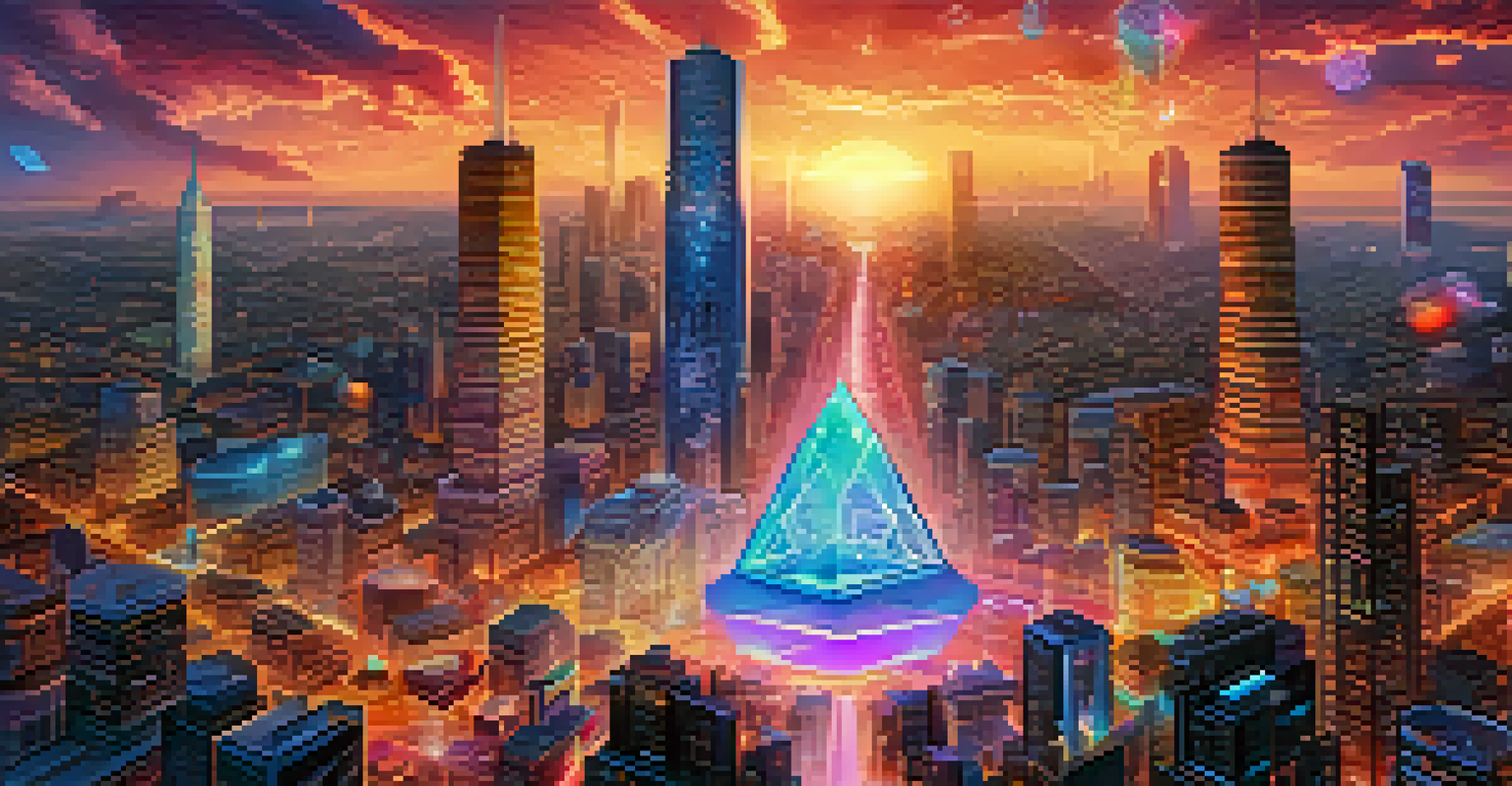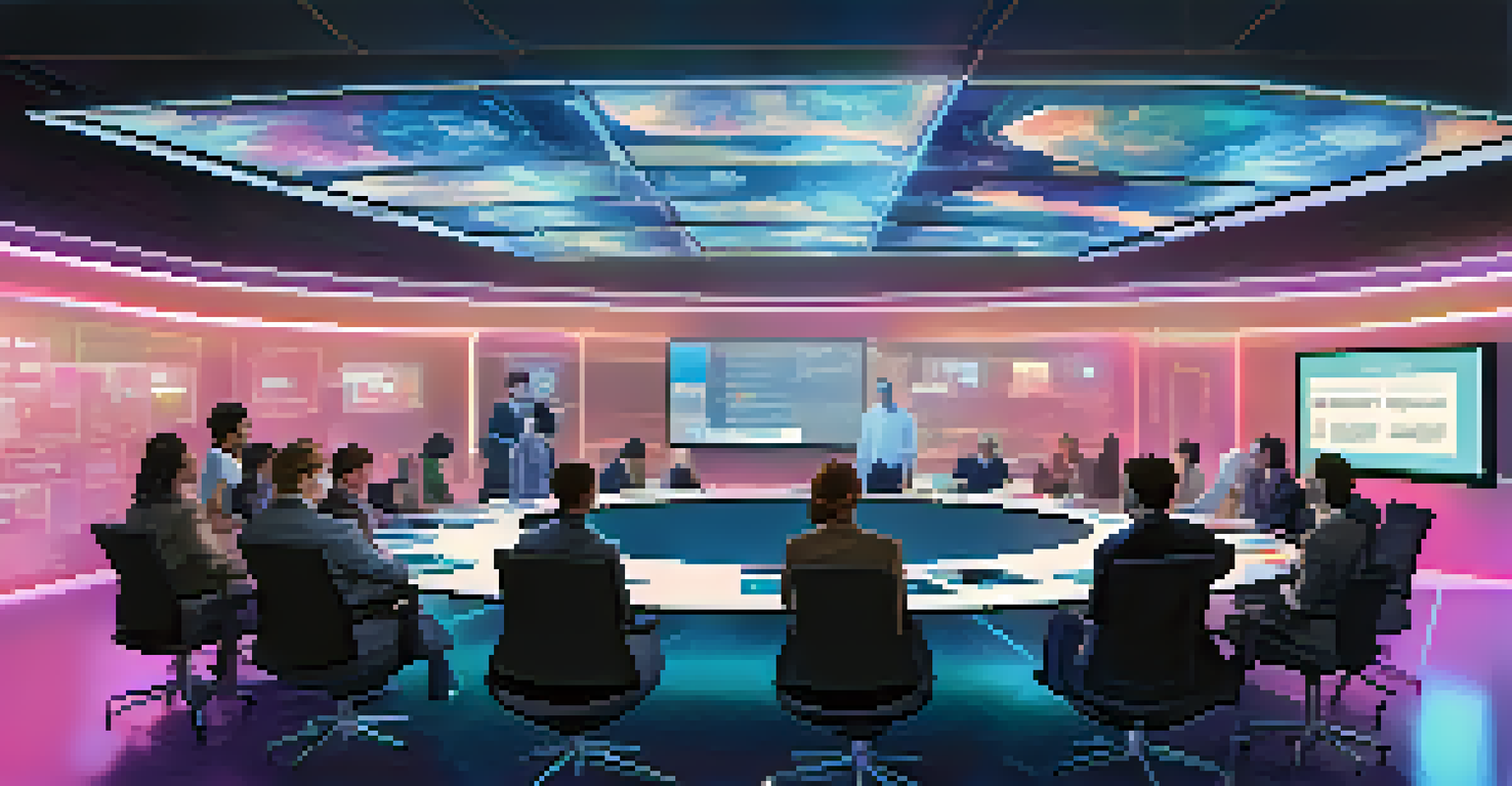The Role of NFTs in Decentralized Autonomous Organizations

Understanding DAOs: The Future of Governance
Decentralized Autonomous Organizations, or DAOs, are a new form of governance that use blockchain technology to create a more democratic way of making decisions. Unlike traditional organizations, which often rely on a centralized authority, DAOs operate on smart contracts, ensuring transparency and reducing the risk of corruption. This innovative structure allows members to vote on proposals and changes, giving everyone a stake in the organization’s direction.
The future of governance is decentralized, and the people are the ones who will hold the keys to their own power.
Imagine a community garden where every participant has a say in what crops to plant and how to maintain the space. That’s similar to how DAOs function, fostering collaboration and shared ownership. The decisions are recorded on the blockchain, making it impossible for one individual to manipulate the outcome, thereby enhancing trust among members.
As DAOs continue to evolve, they are increasingly attracting interest from various industries, including finance, art, and gaming. This growing appeal highlights the potential of DAOs to reshape not just organizational structure but also the way we think about participation and governance in our society.
What Are NFTs and Why Do They Matter?
Non-fungible tokens, or NFTs, are unique digital assets that represent ownership of a specific item or piece of content on the blockchain. Unlike cryptocurrencies such as Bitcoin, which are interchangeable, NFTs are one-of-a-kind and can signify anything from art and music to virtual real estate. This uniqueness is what makes NFTs particularly valuable, as they allow creators to sell their work directly to consumers without intermediaries.

Think of an NFT like a signed edition of a book—while many copies exist, only one can bear the author’s signature, making it special. This characteristic of exclusivity has opened up new revenue streams for artists and creators, giving them more control over their work. As the NFT market expands, so does the potential for innovative applications across various sectors.
DAOs Foster Democratic Governance
Decentralized Autonomous Organizations use blockchain technology to empower members with voting rights and transparent decision-making.
Moreover, NFTs can also enhance digital ownership, allowing users to verify the authenticity and provenance of their digital assets. This capability is essential in an increasingly digital world, where the lines between ownership and access can often blur. As we explore the intersection of NFTs and DAOs, it’s crucial to understand how these technologies can complement each other.
The Intersection of NFTs and DAOs
At the crossroads of NFTs and DAOs lies a compelling synergy that enhances the governance model of decentralized organizations. By integrating NFTs into a DAO, members can represent their ownership stakes or voting rights in a more tangible way. This integration not only fosters engagement but also aligns incentives among participants, ensuring that everyone has a vested interest in the organization’s success.
NFTs enable a new paradigm of ownership, allowing creators and consumers to engage in a more meaningful way.
Imagine a DAO focused on funding artistic projects where contributors receive NFTs representing their voting power. These NFTs can signal a member's influence within the organization, providing a clear and visual representation of their stake. Consequently, the more someone invests in the community, the greater their voice becomes, which cultivates a sense of belonging and responsibility.
Furthermore, the use of NFTs in DAOs can streamline decision-making processes. For instance, an NFT could grant access to exclusive voting privileges on specific proposals, making it easier to manage complex governance structures. This innovative approach could lead to more dynamic and responsive organizations, ultimately enhancing their effectiveness.
NFTs as Governance Tokens in DAOs
In many DAOs, NFTs are being utilized as governance tokens, granting holders the ability to vote on key decisions affecting the organization. This model allows for a more democratic process, as each NFT represents a share of influence, providing a clear framework for participation. By linking governance rights to NFTs, DAOs can ensure that those who contribute significantly to the organization have a proportional say in its direction.
Consider a video game DAO where players earn NFTs by contributing to development or community building. These NFTs can then be used to vote on game updates or new features, giving players a direct role in shaping their gaming experience. This not only empowers the community but also fosters loyalty and commitment among its members.
NFTs Enhance Community Engagement
Integrating NFTs into DAOs can motivate participation and create a sense of ownership among members through rewards and recognition.
Moreover, the transparency offered by blockchain technology ensures that all voting activities are traceable and tamper-proof. This fosters trust within the community, as members can see how decisions are made and how their input is valued. As this trend continues to grow, we may see a shift in how organizations are governed across various industries.
Enhancing Community Engagement with NFTs
One of the standout benefits of integrating NFTs into DAOs is the potential for enhanced community engagement. By rewarding members with NFTs for their contributions—whether it’s voting, attending meetings, or promoting projects—DAOs can create a more vibrant and motivated community. This not only leads to greater participation but also fosters a sense of ownership and pride among members.
Imagine a DAO that holds regular contests where participants can earn unique NFTs for their creative contributions. These NFTs can serve as badges of honor, representing each member’s efforts and achievements. This gamification element can transform the often tedious process of governance into an engaging experience, encouraging more people to get involved.
Additionally, NFTs can serve as a means of recognition, allowing members to showcase their contributions on social media platforms or within the organization. This visibility can attract new members and collaborators, further enriching the community. In this way, NFTs not only act as governance tools but also as instruments for building stronger connections within the organization.
Challenges of Using NFTs in DAOs
While the integration of NFTs in DAOs presents exciting opportunities, it also comes with challenges that need to be addressed. One significant concern is the environmental impact of blockchain technology, particularly regarding energy consumption. As the popularity of NFTs and DAOs grows, so does the scrutiny over their ecological footprint, prompting many to seek sustainable alternatives.
Another challenge lies in the complexity of NFTs themselves. For new users, understanding how to buy, sell, and utilize NFTs within a DAO can be daunting. Simplifying the onboarding process and providing educational resources will be essential for encouraging wider participation and ensuring that everyone feels comfortable engaging with these technologies.
Challenges in NFT Adoption Persist
Despite the benefits, DAOs face challenges like environmental impact, complexity for new users, and legal regulations that need addressing.
Finally, there are legal and regulatory considerations to navigate. As the landscape surrounding digital assets evolves, DAOs utilizing NFTs may face scrutiny regarding compliance and governance. It's crucial for organizations to stay informed about regulations to avoid potential pitfalls and to ensure that their operations remain transparent and lawful.
The Future of NFTs in DAOs
Looking ahead, the role of NFTs in DAOs is poised to expand as both technologies continue to mature. As more people recognize the benefits of decentralized governance, we can expect to see innovative use cases emerge, further intertwining the worlds of NFTs and DAOs. This evolution will likely lead to more robust community-driven initiatives that prioritize collaboration and collective decision-making.
Imagine a future where DAOs operate as fully decentralized entities, with NFTs serving as the backbone of governance and community engagement. Such a landscape could redefine industries, empowering individuals and communities to take control of their futures. The possibilities are endless, from decentralized finance (DeFi) to creative industries and beyond.

Ultimately, the successful integration of NFTs into DAOs will depend on ongoing innovation, education, and a commitment to sustainability. By embracing these challenges and leveraging the unique strengths of both technologies, we can create a more inclusive and participatory digital future that benefits all stakeholders.